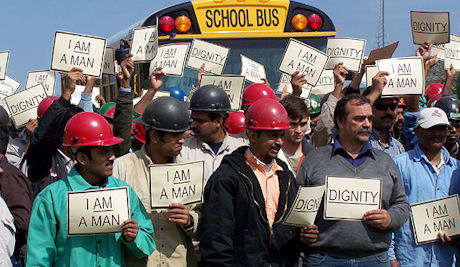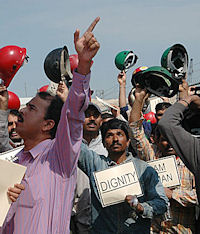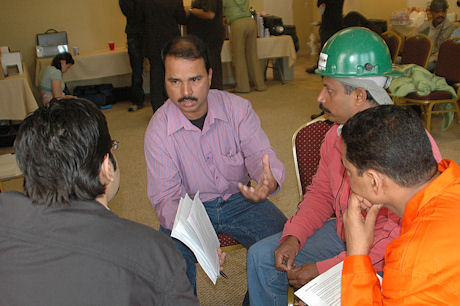Posted March 10, 2008
Indian shipyard workers accuse their employer of human trafficking and forced labor; Guest Worker organizing continues in Mississippi and Louisiana
by Robert Caldwell & Damien Ramos

Shortly after Hurricane Katrina in 2005, hundreds of Indian welders and fitters were trafficked to the Gulf Coast. For a hefty fee of $20,000, the recruiters promised the workers good jobs, permanent residency, and a chance to bring their families to the US. Workers sold their homes, took high-interest loans, and plunged their families into debt to pay for the American Dream.
When they arrived they discovered that all of the promises that had been made to them were false. They learned that in fact, there were no green cards for them. They would not receive permanent status, and there would be no provisions to bring their family members to the United States.

Surely this was better than the way they had lived in India they were told, but many of the workers had worked in several countries and the accommodations here were the worst of all.
When these workers decided that they needed to organize for more humane treatment and to demand that the company make good on the promises made to them the company responded by sending armed guards into the labor camps, pulling the organizers out of bed, holding them captive for six hours. The pressure of being deported back to India with a $20,000 debt waiting at home drove one of the organizers to attempt suicide.
Indian Shipyard Workers on Strike!
On May 9, 2007, 300 workers went on strike at Signal International to demand the release of their organizers. The company backed down, released them – and fired them. The company then ran an intimidation campaign on its employees, forcing the workers to quiet down and accept the conditions of labor trafficking.
Indian Worker Congress continues to organize to fight international labor trafficking.

On March 5, 89 workers- members of the Indian Worker Congress/ Alliance of Guest workers for Dignity (housed in the New Orleans Workers’ Center for Racial Justice) walked out of labor camps and packed a Pascagoula meeting hall for over four hours. They met with other previously fired Signal shipyard workers, activists, and advocates to discuss plans for the next day’s action. Workers spoke Hindi, Tamil, and Malayalam, which was then translated into English, Spanish and Portuguese. There was no need to translate the pain expressed as one of the workers stopped mid sentence- holding back the tears- as he explained that the American Dream had cost far more than the twenty thousand dollars the recruiters charged but ultimately his home and his freedom. He realized that he couldn’t go back home: he had sold his house; he we would be homeless.
The next morning, workers marched to the company gate, singing and singing “We shall overcome” in Hindi and chanting in Malyalam. At the perimeter fence workers held a short rally and left their hard hats to call attention to their continued abuses under the H2B visa program.
Workers then came to New Orleans, where the New Orleans Workers’ Center for Racial Justice held a festive event, celebrating the workers’ newfound freedom in a community gymnasium. The event was attended by 200 people, including Mexican strawberry pickers, Brazilian shipyard workers without work in Mississippi, Day Laborers and community organizers working in New Orleans and translated into five languages.

The Day Laborer Theater Troupe performed a moving play about the Signal Workers and H2B program, followed by an emotional poem and powerful testimonials. The event concluded with everyone singing and dancing to Indian folk songs and a New Orleans brass band.
In the aftermath of Katrina and Rita gulf coast and people from around the world experienced and man made flood of false promises, greed, racism, and exploitation as contractors, business owners, and other opportunists sought to capitalize of some of the most economically disadvantaged, desperate and consequently most vulnerable citizens in the US and abroad. When the arrived, many workers found themselves in a much worse situation that they had been in.
But when the storm pulled into the region, it offered an opportunity to forge new alliances from these diverse communities into a common fight for human and civil rights.
The Indian Worker Congress has filed lawsuits against the labor recruiters and plans to ongoing actions to highlight human rights abuses and international labor trafficking in the U.S. and India.
To contribute to the Alliance of Guest Workers for Dignity’s strike fund, make a check payable to National Immigration Law Center, with NOWCRJ/ guest workers on the subject line, and mail it to: National Immigration Law Center, 3435 Wilshire Boulevard, Suite 2850, Los Angeles, CA 90010
More amazing photos by Ted Quant here: http://www.flickr.com/photos/tedquant/sets/72157604061490756/

Comments
2 responses to “Indian Guest Workers organizing in Mississippi shipyards”
Video of Day 23 of Hunger Strike
Thanks for bringing this to my attention!